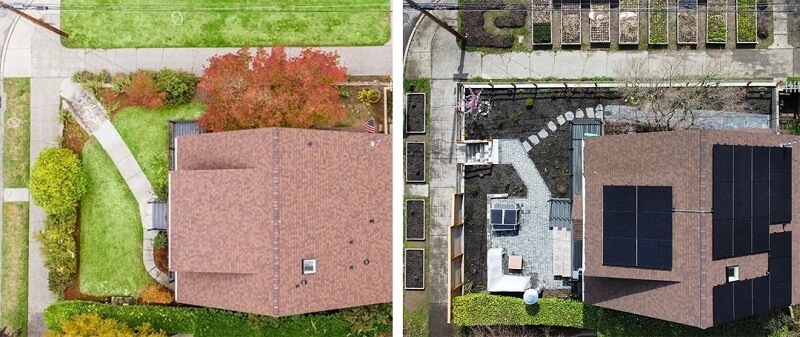One Redditor shared aerial photographs of their lawn before and after replacing their green grass. The user's new lawn, having just been finished, shows mostly empty plots of soil. However, in more images, native plant shrubs and saplings can be seen in their infancy.
The OP explained in the r/NoLawns community that they felt it was worth sharing their native-plant lawn journey before the lawn began sprawling with flora.


"I think it's important to share photos at the beginning stage when everything is still rough," the OP commented, noting that they also added garden boxes and beds. It serves as a reminder that the native-plant lawn journey may not initially be the most pleasing to the eye, but it is nonetheless important.
The National Wildlife Federation reports that an astounding 1 million acres of wildlife habitat are lost to suburban development every single year. NWF also reports that traditional turf lawns use nine billion gallons of water in the U.S. every day.
Considering these statistics, replacing a green grass for native plants — also called rewilding your yard — is an important action to take. Rewilding not only supports local ecosystems, but it also can save you money and reduce water usage.
There are many different ways to rewild your yard, and they don't always require completely ripping out your existing lawn and re-landscaping everything at once.
One way to do this is to begin sprinkling native plant species throughout your lawn, either at the base of trees or near the perimeter of your home. These plants will benefit local pollinator populations by providing habitats and nectar.
You could also spread clover seeds to create a clover cover. This easy and cost-effective strategy helps to reduce mowing and watering, as clover stays green year-round and naturally crowds out weeds. Additionally, clover's extensive root systems prevent soil erosion and allow for moisture to be preserved.
Commenters of the Reddit post were impressed by the OP's full-yard rewild.
"I have to admit it looks a little rough at the moment with so much bare mulch, but as those plants grow I think it'll come into its own wonderfully!" one person shared.
"Even though the growing is sparse, you done a phenomenal job designing this space and it'll be a great journey seeing it progress!" encouraged another user.
Join our free newsletter for easy tips to save more, waste less, and help yourself while helping the planet.









